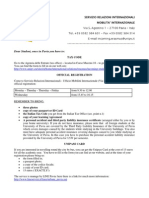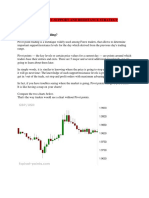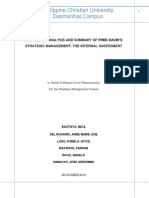Terms and conditions
Trading terms
Table of contents
1. General
2.Contracts for difference (CFDs)
1
�Trading terms
When you open an account on Damu, you can trade contracts for difference (CFDs). Here you will find the
terms and conditions that deal more specifically with trading on Damu including those regarding our
trading rules, pricing policy, payouts, manifest errors, margin, and leverage.
1. General
1.1. We have a general duty to conduct our business with you honestly, fairly, and professionally and to
act in your best interests when opening and closing trades with you.
1.2. We may impose certain rules and restrictions on the placing of market orders on Damu. Such rules
may change from time to time according to market conditions and other factors.
1.3. If you are employed in the banking and/or finance sector, you must not conduct trades through
Derive unless your employer is aware of your trading and the practice does not contravene your
employer’s policies.
1.4. If you use any third-party service provider for trading, it will be your sole responsibility to ensure the
safety of your account and any trading that is conducted. You can refer to the General terms of use for our
business partners for further clarification.
1.5. We might provide you with written information from time to time by publishing it on our website or in
any other way. We make no warranties as to the accuracy of this information. This information shall
under no circumstances constitute or contain any investment advice or recommendations from us.
1.6. We reserve the right to place risk limits on your account, which may affect your trading. These limits
may not be restricted to instruments and trade types. We may also impose trading volume limits on your
account at our sole discretion.
1.7. We have the right to suspend our services or terminate or reverse any trade in any circumstances
where we, at our sole discretion, decide that prices may not be accurate, or cannot otherwise be
determined. These situations include, but are not limited to the following:
1.7.1. When, as a result of political, economic, military, or monetary events (including unusual market
volatility or illiquidity) or any circumstances outside our control, responsibility, and power, our continued
operation is not reasonably possible without significantly harming our interests
1.7.2. When there is an error in trading software or any other IT system
1.7.3. When any means of communication normally used in determining the price or value of any of the
contracts, we offer breaks down
1.7.4. When we decide that the price or value of any of the contracts we offer cannot be quickly or
accurately determined
1.7.5. If we determine that a price cannot be calculated for contracts
1.8. Corporate actions:
1.8.1. A corporate action can include but is not limited to assimilation, acquisition,
bankruptcy, bonus issue, bonus rights, cash dividend, class action, delisting, de-merger,
general announcement, initial public offering (IPO), liquidation, merger, change in par value,
scheme of arrangement, stock dividend, stock split, return of capital, and reverse stock split.
1.8.2. One or more of your trades may be affected by a corporate action. In that case, we may
take one or more of the following measures:
1.8.2.1. Credit an amount to or debit an amount from your account
1.8.2.2. Restrict your account to prevent you from closing any affected trades until the
corporate action is passed
2
�1.9. Manifest errors
1.9.1. To decide if an error is a manifest error or not, we may take into account any relevant information,
including the state of the underlying market at the time of the error and any internal error or lack of
clarity of any information source or pronouncement. You have a duty to report to us any such problems,
errors, or suspected system inadequacies that you may experience. You will not abuse or arbitrage such
system problems or errors for profit.
1.9.2. If we have reason to believe that you have entered into a trade at a price that does not reflect fair
market price or is acquired or sold at an abnormally low level of risk due to an undetected programming
error, bug, or glitch in our website software, market data feed, or due to contract pricing latency, data
feed error, stray quote, incorrect pricing parameter, manifest miscalculation of prices, or other obvious
error (“Manifest errors”), we have the right to cancel or reverse transactions or change the contractual
terms of that trade.
1.9.3. Any amendments to the contractual terms of any executed manifestly erroneous trades shall be
reasonable and fair. These amendments may be done without your involvement and may require actions
that include, but are not limited to, the following: closing or opening positions, placing or deleting orders,
making changes in open positions, and/or deleting trades from trading history.
1.10. Conflicts policy
1.10.1. We aim to establish, maintain, and operate effective organizational and administrative
arrangements to ensure that we take all reasonable steps to prevent any conflicts of interest.
1.10.2. Due to the high degree of risk involved, which could result in the loss of your entire investment, we
have adequate internal procedures in place to make sure that you are in all cases treated fairly and that
the risk of damage to your interests is reduced.
1.10.3. In some of our activities, major conflicts can arise or have arisen. We try to keep a record of
activities that might give rise to a conflict of interest. We also have procedures to manage actual or
potential conflicts. These include procedures to keep appropriate independence among members of our
staff who are involved in potentially conflicting activities. The following are some of the ways we use to
uphold such independence:
1.10.3.1. Maintaining a policy of independence, which requires our staff to act in your best interests and
disregard any conflicts of interest when providing you with our services, or in some circumstances to
decline to act for you or a potential client in order to avoid conflicts of Damu 4 interest If you wish to
know about the conflicts of interest policy in more detail, email your request to cs@damu.co
1.10.3.2. Physical separation of staff
1.10.3.3. Segregation of duties and responsibilities
1.10.3.4. Employing information barriers
1.11. The abusive strategies or arbitrage are extremely prohibited, and if it is committed the company has
the right to seize the capital and the profits when abusing is accrued without any explanation.
3
�2. Contracts for difference (CFDs)
2.1. Margin and leverage
2.1.1. Depending on the type of account that you hold, the leverage applied may vary. All instruments may
have their own leverage.
2.1.2. It is your responsibility to make sure that you have enough balance in your account to cover any
margin needed for opening a position.
2.2. Stop out level
2.2.1. A stop out level may be applied in different circumstances, which include but are not limited to the
following:
2.2.1.1. The server may analyze any orders that are not under execution at the moment.
2.2.1.2. The server may delete the orders with the largest margin.
2.2.1.3. If your margin level is still under the stop out level, the next order may be deleted (orders without
margin requirements are not deleted).
2.2.1.4. If your margin level is still under the stop out level, the server may close the position with the
largest loss.
2.2.1.5. Open positions may be closed until your margin level becomes higher than the stop out level.
Additionally, for fully hedged positions, stop out may be performed on accounts having open positions,
zero margin (covered positions), and negative equity.
2.2.2. The default stops out level applicable to your account is published on our website. However, we
may, at our absolute discretion, change the default stop out level in your real money account. Any
changes to the stop out level may take effect immediately, and we will employ our best efforts to provide
the latest default stop out level on our website.
2.3. Commissions and charges
2.3.1. All prices for financial instruments quoted on our platforms for CFD trading are from liquidity
sources available in the market and are therefore regarded as tradable prices. Any slippage (the
difference between the order price and execution price when orders are filled) from the shown price
during the execution of the order is considered to be a change in underlying prices in the market.
Slippage may increase significantly at the daily bank Damu 5 rollovers. By accepting this agreement, you
acknowledge that we do not offer you any frivolous quotes.
2.3.2. We apply a cost that is realized each time you open and close a trade, which may widen
significantly in some circumstances. This cost predominantly comprises the difference
between the buying price and the selling price (“spread”). We may, at our reasonable
discretion, change the spread.
2.3.3. If you keep any spot FX trading positions open overnight, an interest adjustment will
be made to your trading account to compensate for the cost of keeping your position open.
The interest adjustment (or swap rate) is charged daily. It is based on interbank lending rates,
in addition to a fee that is calculated based on your trade value and charged for every night
that your position is held. The swap rate also depends on the amount of time and/or number
of days that you hold your positions open:
2.3.3.1. Our swap rate may also be adjusted to take public holidays in any jurisdiction into
account.
2.3.3.2. Since it takes two days for FX transactions to settle, positions that are still open on
Wednesday at the swap calculation time will be charged three times the swap rate to account
for weekends – a standard practice for all FX brokers.
4
2.3.3.3. If you keep a position open past the swap calculation time, you will be subjected to
the basic swap rate.
�2.4. Order execution
2.4.1. When we execute orders on your behalf, we have a duty to provide you with best execution. Best
execution means that we must take reasonable steps to obtain the best possible result for you when
executing your order according to your instructions. We will endeavor to follow your instructions as far as
reasonably possible, acting in accordance with our duty of best execution. These specific instructions
include, but are not limited to, the following:
2.4.1.1. The price at which your order will be executed
2.4.1.2. We will act on any instructions that you give us, or appear to give us, in relation to margin trading
services provided through the MT5 trading platform. However, we are not obliged to act on any
instructions that you give us, and we are not obliged to give you any reasons for declining to do so.
Instructions that you give us are considered final and you cannot revoke them. It is your responsibility to
make sure that the instructions you give us are accurate and reflect your trading decisions.
2.4.2. Trade confirmation is in real time: once you click on ‘Buy’ or ‘Sell’, your trade is confirmed.
2.4.3. The timeframe or duration of the contract as defined by your order execution instructions We
always adhere to our best execution obligations and act in your best interest; however, sometimes your
specific instructions might prevent us from achieving the best possible result.
2.4.4. Our order execution policy includes a set of procedures designed to obtain the best possible
execution result for you. To do so, we consider the following factors:
2.4.4.1. Price and cost: The price at which the transaction in relation to your order is executed and the
cost of executing your order, which predominantly comprises spreads are taken into consideration.
2.4.4.2. Likelihood of settlement: When markets are volatile, our trading platform runs across a high
number of concurrent online users, high volumes of client orders, and a high number of imported price
ticks. As part of our best execution policy, we seek to ensure that our platform runs smoothly under such
unstable conditions and we take all reasonable steps to safeguard the continuity and regularity in our
services.
2.4.4.3. Likelihood of execution: We seek to ensure that all placed orders are executed; however, this is
not always possible due to material difficulties or unusual circumstances. Whenever we become aware of
any material difficulty in relation to the proper execution of an order, we will inform you of the issue as
soon as reasonably possible.
2.4.4.4. Speed: Due to the online nature of our business, there is a small delay between an order being
entered and the same order being executed on the server. Any significant delay can have negative
impacts for you; we therefore monitor the latency between the time your order is entered and executed.
2.4.5. Our execution policy cannot and does not guarantee that when we enter into trades with you, the
price will always be better than a price that is or might have been available elsewhere.
2.4.6. We shall regularly monitor the effectiveness of our order execution policy. From time to time, we
shall check the venues that form the basis of our trade pricing, and if we detect that best execution is
not achieved consistently, we may change our execution arrangements.
2.4.7. Our commitment to providing you with best execution does not mean that we owe you any fiduciary
responsibilities over and above the specific regulatory obligations placed on us or as may be otherwise
contracted between you and us.
2.4.8. For some trades, there may be no functioning or open market or exchange on which the reference
product is traded at the time of your order. In such cases, we endeavor to determine a fair underlying
price based on a number of factors, such as price movements on associated markets, other market
5
influences, and information about your order.






















































































